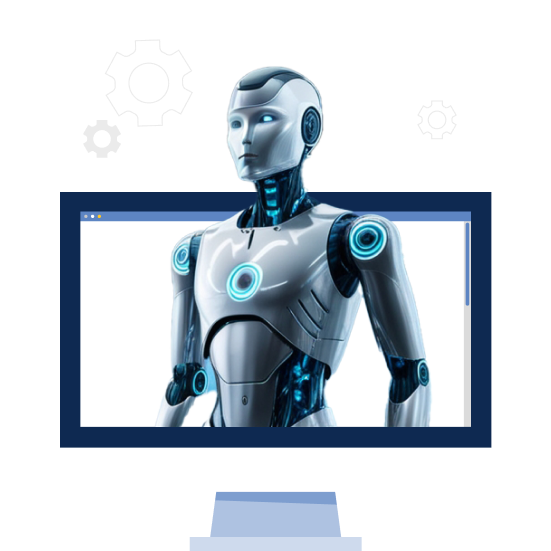Mastering AI Tools is the Key to Market Leadership
7/05/2025

Start for free
If you believe there's no point in integrating machine learning into your business, think about what your competitors might be doing, now Google uses AI as the third most important factor in displaying search results even Amazon employs it in computer vision to enable teams of robots to pick items from over a million products in its warehouses to assemble and deliver packages, in London Stratified Medical uses it to discover patterns in data that humans might overlook, thus identifying potential new drugs.
Artificial intelligence is not just a consumer-facing technology that its potential use is vast and according to a recent report by the market research firm Tractica, the cumulative global spending on enterprise AI systems reached $40.6 billion by the end of 2024.
We must recognize that the world is heading toward unimaginable developments, we are now living in a stage where humans and machines coexist, now AI is intertwined in various business operations, systems, and daily tasks, it leverages self-learning systems using tools such as data mining, pattern recognition, and natural language processing, In terms of surpassing human intelligence in business environments, AI has high scalability that leads to significant cost savings and its consistency , reliance on pre-programmed rules allow organizations to reduce errors, because of its continuous development capabilities and process documentation, it offers valuable business opportunities and other important benefits.
Traditional Methods of Understanding Customers Don’t Work for Data-Driven Teams
According to Grand View Research estimates, the global AI industry will grow from $136.6 billion in 2022 to $1,811.8 billion by 2030, with a compound annual growth rate (CAGR) of 38.1%, this is because traditional feedback processing is slow and fragmented across different teams and relies solely on general satisfaction metrics without delving into the actual detailed feedback which doesn’t enable actionable insights, now customers demand a smarter, faster, and enhanced experience from service providers by deploying AI solutions to deliver the insights and acceleration required to empower future market leaders to succeed in this new landscape.
This shift requires the integration of multiple technologies and comprehensive strategic solutions, furthermore the companies that will succeed in the future are those capable of leveraging these insights to deliver personalized customer experiences which built from the outside from the customer’s needs perspective instead of the traditional approach based on separate internal units or products.
AI’s Influence on Business Marketing Is Growing Daily
In a world where customers can search for products, compare prices online, purchase from any company globally, and influence other shoppers via social media, technology is advancing at an unprecedented pace so the teams that have already begun using AI-driven marketing programs have a clear competitive edge that allows them to keep up with upcoming innovations that is embracing this AI growth and evolution is crucial for future marketing efforts, now companies use AI daily to optimize operations, reduce operational costs, shorten turnaround times, and enhance outputs.
Marketing departments can use AI to segment audiences, develop personalized campaigns for each segment, automate ad planning, conduct keyword research, and manage real-time bidding, these applications span across social media marketing, mobile marketing, and search engine optimization, the ability to target the right audience in highly competitive markets is critical and companies use data to determine which type of customer will see which ad, improving the effectiveness of their marketing campaigns.
Classifications of AI Tools in Business
There is a compelling classification of AI applications divided into three types: Mechanical Intelligence, Thinking Intelligence, and Emotional Intelligence.
- Mechanical intelligence—the first level of AI—automates routine tasks.
- Thinking intelligence deals with data processing to produce insights that support decision-making and contribute to competitive advantage.
- Emotional intelligence engages in interactive dialogue with humans by analyzing their needs and emotions.

Mastering AI Tools is the Key to Market Leadership
How to Harness Digital Transformation to Boost Competitive Advantage and Improve Institutional Performance
Some companies have begun experimenting with AI, while others are still unsure of the next steps to help grow their brand and turn every interaction into revenue through the smart customer journey, overall forward-thinking companies assign the responsibility of AI implementation to senior employees for innovation, making them accountable for rolling out the technology across the organization and more conservative companies, on the other hand, rely on management consultants to create a strategic plan and assist with its implementation.
You can explore the following areas to understand how leading companies use these tools to enhance customer experience design and achieve digital transformation:
1 - Social Media Monitoring and Analysis
Social data goes beyond mere monitoring ,it enables you to tap into growth areas and to achieve this, data analysis should not be limited to technical aspects but led by experts in consumer behavior through a set of interconnected processes and through essential monitoring aimed at guiding various functions to improve business decisions based on the voice of the customer, with a focus on extracting actionable insights, companies can identify opportunities, threats, and online brand value and by collecting and analyzing unstructured feedback AI helps uncover customer insights that allow your company to stay aligned with the voice of the customer and make better data-driven decisions.
2 - Insight Generation
This involves extracting actionable information from the ever-increasing volume of raw data, with global information doubling nearly every year, it’s no surprise that data complexity is among the top challenges hindering digital transformation, “listening” is a rapidly growing use of AI lies in to all customer communication channels Whether direct with the company and general market conversations such as call center discussions, chats, and social media interactions that is AI tools can analyze massive volumes of diverse data to provide precise insights into customer sentiments toward products or services and the reasons behind those sentiments.
3 - Deep Customer Engagement
Achieving deep customer engagement has always been a core goal of marketing and CRM programs, personalizing content and information today AI enhances this engagement by to an unprecedented level this is evident in the new generation of interaction tools such as virtual assistants and chatbots these programs that use messaging interfaces to deliver support, answers, and personalized content, which have become more effective because of the advances in machine learning and natural language processing.
Customer relationship quality stands out as a critical area, while some user express satisfaction, many may show frustration due to unresolved issues, poor communication, or indifference to their problems that is highlights the importance of improving support channels and response speed so the AI tools help revolutionize CRM systems, reducing reliance on constant human updates and transforming CRMs into self-updating, self-correcting systems—delivering organized customer management and unmatched service.
4 - Organizing and Gathering Data to Accelerate Business and Understand the Market
This refers to using AI to accelerate knowledge-based activities, thereby improving efficiency and performance, these initiatives are often seen as a cost-reduction method through automation and as an opportunity to enhance the customer experience ,this aligns with the new wave of transformation driven by information analysis, enabling organizations to deliver products and services that meet consumer needs at the right moment and place, this Achieving requires the ability to collect and analyze vast amounts of structured and unstructured data and use these insights to make and execute decisions in real time.
5 - Cybersecurity Enhancements
AI is fundamental in detecting vulnerabilities in computer network security which enable AI systems to identify cyberattacks and other threats by analyzing data patterns and they can pinpoint the source of threats and help prevent future attacks, so with its wide range of applications, AI can detect trends in data to reduce risk, improve customer service through virtual assistants, and analyze millions of documents on company servers to uncover compliance failures.
6 - Improving Efficiency in the Supply Chain
If your company is facing frequent delays in product deliveries, AI can play a vital role in improving that, AI-powered solutions help predict product flow speed across the supply chain and estimate material and shipping costs, these analytics provide experts with the necessary information to make more efficient distribution decisions, at the local level, AI can also contribute to identifying the fastest delivery routes for local customers.

Mastering AI Tools is the Key to Market Leadership
Getting Started with AI
Integrating AI aligns with nearly any business strategy and to begin using it, it’s essential to understand how data is collected and analyzed, Since AI relies heavily on data, your understanding of how it works will help you determine how to benefit from it in your industry by applying the following:
- Intelligently guiding customer interactions resolving simple inquiries and completing complex tasks with seamless handover to human specialists when needed
- Outcome-driven actions from ticket resolution to closing sales, each step is designed by specialists to deliver tangible results
- Unified customer memory storing customer preferences, past interactions, and data to offer a personalized experience
- Consistent brand experience providing an integrated and context-aware experience across all interactions, including sentiment analysis, topic clustering, crisis detection, and more
- Smart recommendations suggesting timely upgrades or add-on products
- Real-time contextual offers using customer data and momentary context to deliver offers that feel natural and helpful
- < Facilitating understanding and immediate response via real-time analytics to track and address feedback/li>
- Covering language used by customers and the market including intuitive relationships between phrases
- Learning new words such as slang, acronyms, and industry-specific or company-specific terms from their usage context
- Automating workflows and integration by connecting with multiple gateways such as email portals, user interfaces, SMS gateways, servers, storage, networks, and cloud infrastructure
- Access via web portals or mobile apps for monitoring and analysis
- Social media and public channel monitoring including forums and relevant sources
- Unlimited instant alerts and reports to track trending issues, crises, and actionable insights
- Unlimited dashboards for depth analysis with dynamic visualization capabilities
- AI-powered trend forecasting and organizational impact analysis
- Decision-making support in policies, pricing, and public communication strategies
- Measuring customer satisfaction and analyzing sentiment to assess customer responses
Smart Tools Designed to Achieve Business Goals
AI solution providers actively work to meet your business goals and craft a customer experience that reflects this new reality—by applying AI to communication products and applications:
AI Chatbot
Have you ever visited a website and been greeted by a chatbot? Customer interaction with AI often begins through AI chatbots, which are increasingly used by companies to automate many customer service processes, this allows employees to focus on cases that require more personalized attention certainly AI chatbots utilize a combination of natural language processing, machine learning, and AI to understand user requests that can also transfer the customer to a human agent better equipped to handle the query.
AI Callbot
Some companies are praised for their fast service, user-friendly apps, and ongoing improvements Due to intelligent tools in customer communication and one of the key capabilities of any smart application is its ability to simulate human intelligence by having natural conversations that understand the user, anticipate their needs, and respond appropriately, this enables customers to talk to the system as if they were speaking to a real person and receive intelligent replies and the AI Callbot remembers previous conversations, can shift to another topic and then return to the original one, and unlike many humans it remembers user preferences from one interaction to the next.
Examples of AI Applications in Business
Apple Pay, Google Pay, and PayPal are examples of automated payment tools that leverage AI technologies and reinforcement learning algorithms can dynamically adjust pricing by factoring in customer preferences, competitor activity, and supply characteristics.
AI is also used in a wide range of healthcare services including medical imaging, drug management, drug development, robotic surgery, and data mining to discover patterns enabling more accurate disease diagnoses and treatments.
Retail and e-commerce are among the few sectors where most end consumers can directly see AI applications and about the prime example is the product recommendations on your Amazon account, which are the result of advanced AI algorithms identifying items you are likely to purchase.
In financial services and banking, AI-powered chatbots are used in the insurance sector to enhance customer experience and design personalized insurance plans based on their data, AI tools have significantly accelerated the claims processing cycle, benefiting both customers and insurance providers.
Taqnyat have proven their readiness and the success of their research-driven approach by offering features and uses that help organizations understand the full landscape its details, opportunities, and challenges.
Smart tools that are flexible, cost-effective, and easy to implement
FAQ
